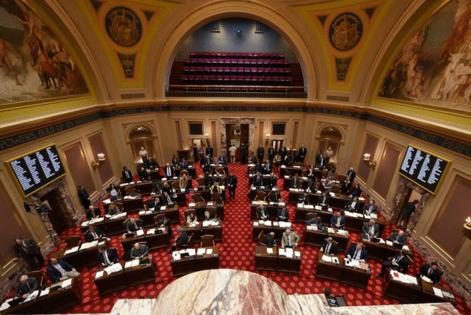Proposed tax on social media platforms in Minnesota could raise over $300M
Published in News & Features
Minnesota legislators are weighing a new tax on social media platforms that could raise $334 million in the next four years as the state faces a multibillion-dollar deficit later this decade and uncertainty surrounding federal funding.
Under a proposal introduced by Senate Taxes Committee Chair Ann Rest, DFL-New Hope, large social media platforms like Facebook, Instagram, TikTok and X would pay a tax on the collection of user data, which they sell to advertisers.
What lawmakers said is a first-of-its-kind state tax would be based on usership for platforms with 100,000 or more monthly users in Minnesota. It would scale up depending on the number of users on the platform, with the top bracket applying to platforms with 1 million or more users.
“For many years now, social media platforms and businesses have taken our information, our identifying information, and used it to make millions and millions of dollars,” Rest told the Senate Taxes Committee as she presented her bill on Wednesday. “We hope we can modernize the way in which our tax systems work, recognizing the world has greatly changed.”
Revenue expected to grow
If the new social media tax were to take effect as a part of this year’s two-year state budget, it would raise about $46 million in its first year. That amount is expected to grow to more than $90 million annually in the following three years, according to an analysis by the Minnesota Department of Revenue.
The Senate and House tax committees heard versions of the bill Wednesday and held it over for possible inclusion in a larger tax package bill later in the session. It could face a tough path forward in the House, where Republicans and Democrats both have 67 seats. GOP lawmakers say the state shouldn’t pass any new taxes and should focus on rolling back the large expansion of spending that happened under Democratic-Farmer-Labor controlled government in 2023.
Rest and other supporters who testified in favor of the new tax said it would ensure that large companies profiting off user data — which they get by providing otherwise free services — are paying their fair share in Minnesota.
“This bill proceeds from the very reasonable premise that this extraction of value should be taxed the way the extraction of many other valuable natural resources are taxed,” said University of California — Davis law professor Darien Shanske, whose work focuses on state and local tax policy.
Economic disruptions and federal budget cuts caused by President Donald Trump also could mean more stress on state resources in the months and years ahead, supporters said.
“This bill is badly needed because it provides revenue that could be used to help those that will be hurt if the social safety net is shredded,” said Phillip Sandro, a retiree with health issues living on a fixed income who spoke for the progressive faith group Isaiah.
Supporters also argued that negative social consequences from social media platforms, such as potential harm to younger users’ mental health, warrant taxation because of the cost they pose to society. Politicians have targeted companies like Facebook parent Meta in recent years after studies showed that excessive teen social media use was tied to psychological distress.
GOP says state should curb spending
Minnesota is set to have a $456 million budget surplus in 2026-2027, but as lawmakers put together a two-year state budget this spring, a $6 billion deficit looms in the following 2028-2029 fiscal year. Early proposals from the Governor’s Office, House and Senate have largely centered around billions in cuts, but Democratic-Farmer-Labor senators and representatives have left new taxes on the table.
Republican Senators questioned the need for any new taxes when the state grew spending by 40% in the last budget passed in 2023, which saw state spending top $70 billion and used most of a record $18 billion budget surplus.
“The reason why the state of Minnesota is facing a $6 billion structural deficit is because of the overspending, the unsustainable spending over the last two years,” said Sen. Jeremy Miller, R-Winona. “When you spend more than the revenue coming in, it’s unsustainable; it’s simple math.”
Opponents also said a tax on social media platforms will hurt small businesses in the state who rely on targeted advertising to reach local and regional customers. New social media taxes would mean big companies would pass the cost along to smaller business customers, argued it would limit access to targeted ads.
“Minnesota’s consumers, small businesses, retailers, family farms and even newspapers that would feel this squeeze,” said Deb Peters, a lobbyist with Americans for Digital Opportunity and the Association of National Advertisers. “Taxing advertising, especially online, raises prices for everyone.”
Business interests also noted that passing a law targeting social media with a new tax could attract legal action. The Internet Tax Freedom Act, originally passed in 1998, protects online businesses from state and local government taxes that apply only to digital commerce, wrote the Midwest branch of TechNet, a group representing technology executives.
_____
©2025 MediaNews Group, Inc. Visit at twincities.com. Distributed by Tribune Content Agency, LLC.







Comments